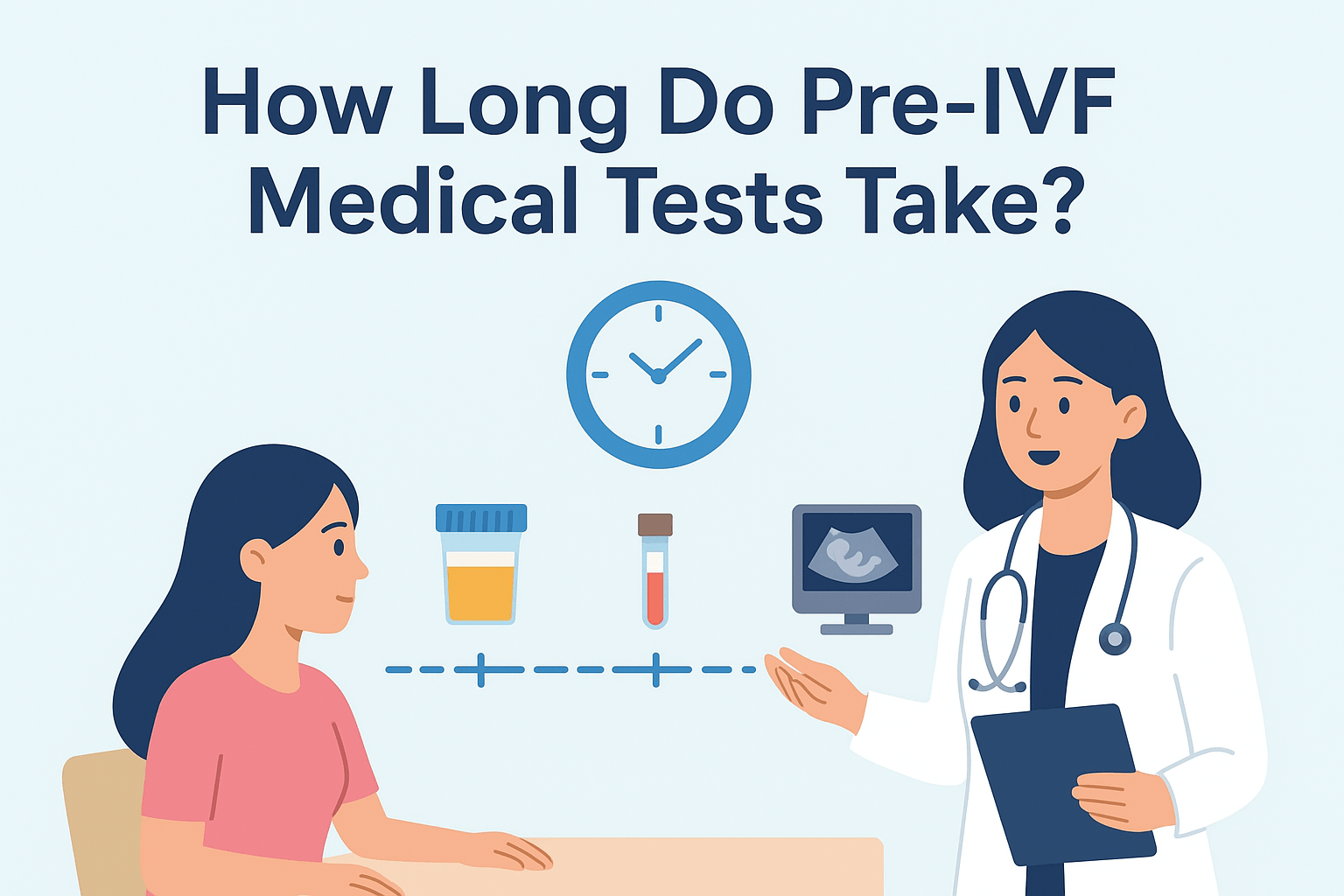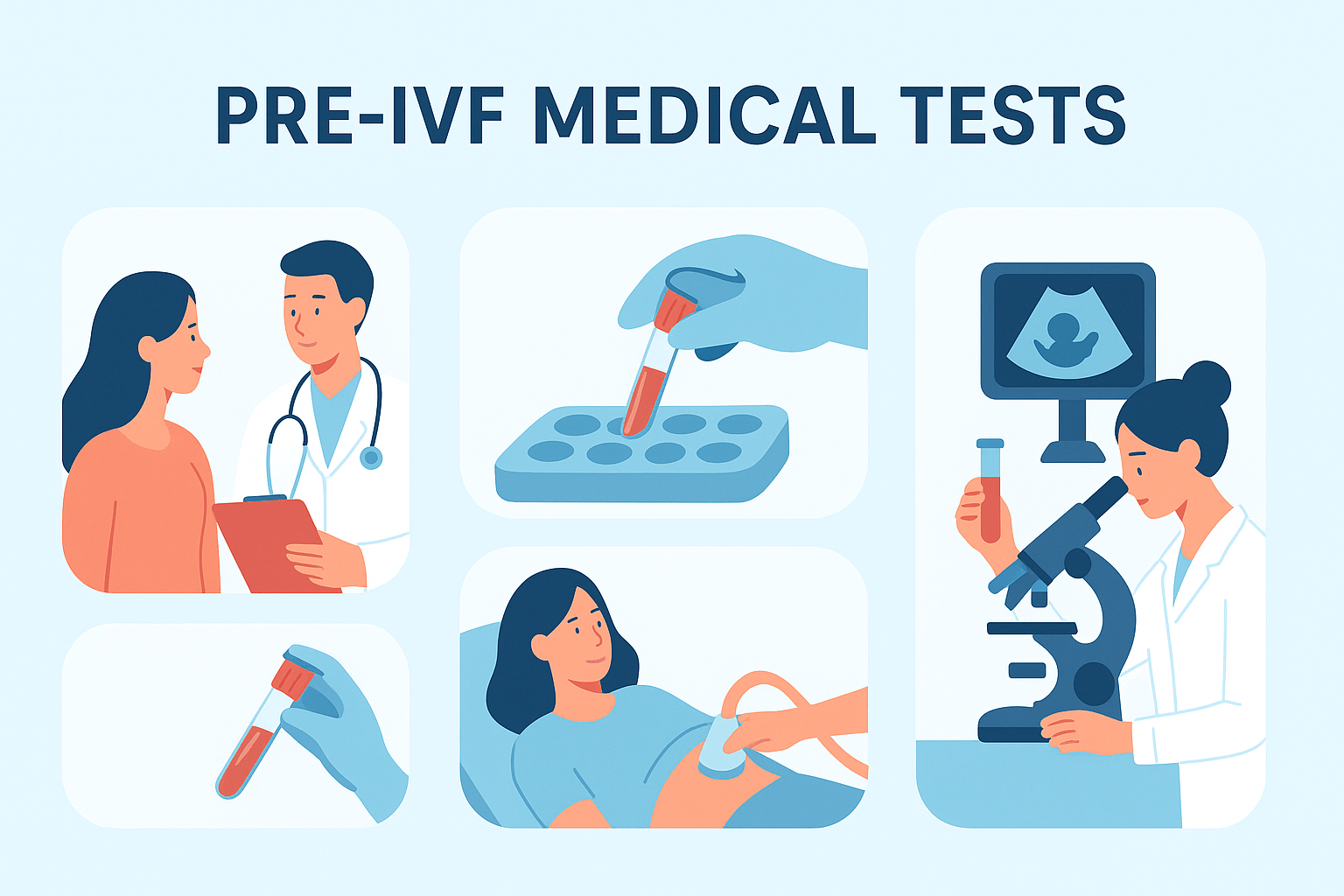How Long Do Pre-IVF Medical Tests Take?

Before the IVF, there are certain preliminary tests that one should take, known as pre-IVF medical tests. These are some diagnostic tests that are performed on both partners before the treatment to analyze, identify, and assess the overall and reproductive health.
This is a standard test performed in almost all IVF centers and marked as the primary step before the treatment. Males and females have different, distinct tests to identify their issues, and these can help create a personalized and effective treatment plan.
What Are The Pre-IVF Medical Tests?

Ovarian Reserve Testing
Ovarian reserve testing is a combination of procedures that help to assess a woman’s egg supply and fertility potential. This test can help doctors assess the chances of conception and the response to fertility treatments. The purpose of the ovarian reserve testing is to estimate the chances of natural conception by calculating the woman’s remaining eggs. This test will also enable the doctor to predict the response to the treatment. This test also assists in the diagnosis of certain underlying conditions, such as PCOS
Uterine Evaluation
These are a group of tests that assess the condition of the uterus and check for any abnormal complications. These tests assess the quality of the endometrial lining, and they check for fibroids, polyps, and other abnormalities that can directly affect fertility. The tests include
1. Transvaginal Ultrasound(TVS): An ultrasound that shows the endometrial lining and uterine cavity. Serves as a test for screening abnormalities, an initial test to analyze and assess the uterine cavity, and the issues it may have.
2. Sonohysterography: It’s an ultrasound where saline is injected into the uterus to expand the cavity to provide a better visualisation. It identifies and defines abnormalities like fibroids and polyps that may be seen on an ultrasound.
3. Hysterosalpinogogram(HSG): It’s an X-ray test where a dye is injected into the uterus and fallopian tubes to see the structural abnormalities. It’s used to check the blockages in the fallopian tubes.
4. Hysteroscopy: It is A minimally invasive procedure where a thin lighted camera is inserted into the uterus and cervix to view the insides of the uterine canal. It’s used when the other tests suggest a problem, and is considered the final test to find out the complications.
Hormone Blood Tests
These pre IVF blood tests measure hormones like FSH, LH, Progesterone, etc., which play a huge role in ovulation.
Semen Analysis
Semen analysis is a test that is used to profile and evaluate the sperm count, motility, and morphology of the sperm. This can give an insight into the health and viability of the sperm.
Infectious Disease Screening
This is a test that’s used on both partners to identify and treat any underlying infections before the IVF. These infections may sabotage the treatment if left unattended.
Genetic Testing
Certain people might carry certain diseases that might be passed on to their offspring. Genetic testing is used to identify these issues, so it helps guide medical management and treatment options.
These are the main PRE IVF tests; these tests help to assess the fertility health of both partners.
How Long Do These Tests Take?
All these from the initial consultations, to bloodwork and ultrasound, and might take approximately 2 to 4 weeks to complete, depending on the facilities and tests. The genetic screening and certain other tests may take weeks to process due to their complexity.
The phase of the whole process starts with an initial consultation, which can last about one to two weeks, where the specialists will go through the family history and your medical history while plotting the pre-IVF test plans. This phase is primarily conversational.
The Medical and Fertility Testing phase will take about two to four weeks, depending on the conditions and technical facilities of the IVF centre, and it also depends on your health condition.
Documents And Information Needed For Pre-IVF Tests
There are certain documents that one should carry when going for a pre-IVF checkup.
Medical and personal history
Remember to take your medical history, as it may help in the treatment. The medical history should include any long-term medications you are taking right now, information, and hospital records about any major surgeries or medical procedures that you have undergone. If you have been through IVF treatment before in any other clinic, then bring that also, because it can help the doctors to understand the situation better.
Your personal history should include the family history, mainly the health conditions of your near relatives, and any specific disorders they have. This is important because sometimes the family history might have some elements that may contribute to the cause of infertility.
Marriage Certificate
A marriage certificate is a necessary legal requirement for a heterosexual couple trying to conceive a baby through IVF. It’s due to the Assisted Reproductive Technology (Regulation) Act (2021) and its related laws. The marriage certificate legally binds and confirms the status of the couple. This is only applicable to Heterosexual couples. This act has different regulations for single parents and other individuals.
Consent Forms
Many of these procedures involve signing a consent form, which will be provided to you before the procedure. Take time to read the forms and ask for any doubts, and remember to fill them out and sign them when coming for the pre-IVF tests.
LIfestyle Assessment
Lifestyle is an important thing to consider when you’re planning for IVF. You should stick to a healthy lifestyle and make the necessary adjustments suggested by the specialists, and be prepared to share the essential details about your lifestyle honestly.
Conclusion
IVF pre treatment tests are not complicated procedures, but often, due to the outlook of the patients regarding this phase, they often fill their minds with anxiety; the fact is, it’s a general procedure. Make sure you take all the documents and information gathered before going to the Pre-IVF medical tests to ensure an effortless procedure. The time will depend on a lot of factors, from your health and family history to the technical facilities at the IVF centre you chose. Generally, it can take two to four weeks.
Whatever happens, be patient and wait for the test results, stay cool and calm.
FAQ
Generally, it takes about two to 4 weeks, but it depends on a lot of factors, from your health conditions to the technical facilities of the IVF center.
Semen analysis is one of the main pre-IVF tests for men, along with the regular blood tests, which are common for both genders
There are a lot of options for the IVF procedure, such as the ICSI, which the specialist will suggest for the IVF procedure.
Ovarian reserve testing and Uterine fallopian tube evaluation are the main procedures, along with hormonal and general blood tests.
Generally, no, but sometimes the doctor will prescribe some Birth control medicines to regulate the menstrual cycle.
